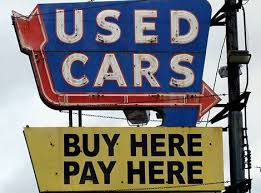Blog
- All
- Credit Reporting Issues
- Debt Collector Abuse
- Featured
- KY Consumer Law
- Resources
- Significant Cases
- Uncategorized
Have you been denied an Apartment Rental application?
Finding a place to live is hard. Being denied an Apartment Rental application makes the search harder and more expensive. (Those non-refundable application fees can ...
Read More
Vroom is a No-Go when it Comes to Title Transfers
If you bought a car from Vroom but cannot get good title to the vehicle after delivery, we are to help. And you are not ...
Read More
Stop Credit Card and Insurance Junk Mail
How do banks and insurance companies know to send you credit card and insurance-policy offers? Because banks and insurance companies buy your personal information from ...
Read More
Buy Here—Pay Here: The Carnival Game of Buying a Used Vehicle
Buy here—pay here “’is not the car business. This is the finance business,’ said Ken Shilson, an accountant who founded the National Alliance of ...
Read More
Have you been sued by Service Financial Company? If so, we can help.
Chances are, you don’t even know who the heck Service Financial Company (“SFC”) is. SFC is an assumed name for the River City Adjustment Bureau, ...
Read More
Have you been Sued by Mariner Finance, LLC?
If you’re here, it’s mostly likely because Mariner Finance sued you. We may be able to help. We’ll evaluate your case at no cost to ...
Read More






